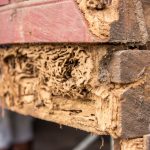Rodents such as rats and mice are more than a nuisance. Not only can they chew through wires and create a mess, but they also pose serious health risks.
After all, these not-so-nice critters were responsible for the bubonic plague which killed millions of people in 14th century Europe.
To help you understand why rodents are dangerous – and why you need adequate pest control – this blog will highlight the major diseases that they can transmit to people in your home.
Leptospirosis
Leptospirosis or Weil’s disease is caused by the Leptospira bacteria. It’s passed from rats to humans when people get into direct contact with water, soil, mud and vegetation contaminated by infected rat urine. The bacteria can usually get into the human body through cuts and abrasions on the skin or even through the mucous membrane that lines the mouth, nose and surface of the eyes.
Leptospirosis usually causes flu-like symptoms including high fever, nausea, vomiting, headache, diarrhea, loss of appetite and sometimes even conjunctivitis and muscle and joint pains. While most people do recover, some can progress to develop Weil’s disease which can cause jaundice.
Mouse Typhoid
Mouse typhoid is caused by Salmonella and is spread through mice faeces. Most of the time, humans contract it when they use contaminated utensils or eat contaminated food.
Symptoms include stomach pain, diarrhea, fever and vomiting. These bacteria used to be quite commonly found in chicken eggs when it’s passed from mice to chickens but are very rare now.
Murine Typhus
Fleas from infected rats and mice can transmit murine typhus fever to humans when they bite human skin or contaminate the area with their fecal matter.
Symptoms of murine typhus are headache, fever, joint and muscle pain, nausea and vomiting. Half of patients develop a distinct rash 6 days after the first symptoms, while up to 45% of people can develop neurological issues including seizures and confusion.
Most patients fully recover with antibiotic treatment, but death can occur in people with a weak immune system (such as the elderly and young children).
Trichinosis
Trichinosis is caused by eating undercooked pork that’s infected with the larvae of Trichinella spiralis, a roundworm.
Rats and mice are responsible for spreading trichinosis because they carry parasite-containing cysts which can get passed on to pigs.
Trichinosis causes abdominal pain, fever, diarrhea as well as joint and muscle pain. However, cases are very rare thanks to legislation in the farming industry and public awareness. To avoid getting infected, remember to properly cook your meat, especially pork.
Rat- Bite Fever
Like the name suggests, rat-bite fever is mainly transmitted when someone is bitten by a rodent. However, it can also be spread when people encounter food or water contaminated with rat urine and mucous secretions.
People can also be infected when their pets are exposed to infected rats. Therefore, it always pays to be careful when you notice rats and mice around your home or neighborhood.
Though symptoms vary, they include ulcers and rashes around the wound, as well as fever, vomiting and muscle aches. If you’re bitten by a rodent, immediately wash the wound area with an antiseptic solution and get treatment.
Favus/Tinea Favosa
Tinea favosa is a fungal infection that affects the skin. People can contract it through direct contact with rodents and even infected pets or patients.
This fungus causes scutula (crusty, yellow, cup-shaped formations) to form on the scalp and less commonly on other parts of the skin and nails. The scutula normally forms around a clump of hair, contains cultures of the fungus and has an unpleasant mousy odor.
Favus is mostly treated with oral medication as well as topical shampoo, lotion and cream.
Keep Your Home Safe with Quality Pest Control Management
Rats and mice can pose a serious health threat to you and your family.
If you need a professional rodent control service to keep your home safe, don’t hesitate to get in touch with us today!
As with all pests, it’s much safer to get on top of the problem early before you suffer the effects of a serious infestation.

